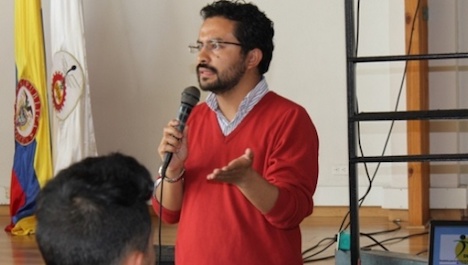Why is Colombian Paramilitary Violence Up After Peace Signed?
 Print This Print This
By Msrion Deschamps
teleSUR
Tuesday, Nov 22, 2016
 |
| Camilo Fagua, a human rights defender in Colombia. | Photo: SENA |
After several murders of campesino leaders in Colombia, teleSUR spoke with a human rights defender to get a perspective on the situation in the country.
In the context of a surge of paramilitary violence and assassination of human rights activists in Colombia after a new peace accord between the government and the Revolutionary Armed Forces of Colombia was signed, teleSUR spoke with Camilo Fagua, lawyer for the Foundation of the Defense of Human Rights in Eastern and Central Colombia and member of the social and political movement Patriotic March.
teleSUR: Could you explain in detail what your work consists of in defending the rights of rural communities in eastern and central Colombia?
Camilo Fagua: I have worked with the rural communities in the nine departments of eastern Colombia for the training and the defense of human rights, as well as doing pedagogy for peace.
teleSUR: In your opinion, who is murdering the campesinos? The government claims the murderers are not paramilitary groups. Has there been more murders since the beginning of the peace negotiations and the demobilization of the FARC rebels?
Camilo Fagua: Since 2011 until now, we have observed a wave of violence against social leaders, campesinos, Indigenous leaders, students, women. As for the Marcha Patriotica, more than 123 members have been assassinated, including 70 alone in 2016, as well as 279 death threats.
Without a doubt, behind these crimes are the enemies of peace, among them are the structures that come from the previous paramilitary groups, which defend the political interests of those against peace in Colombia.
The paramilitary groups wish to control the areas historically controlled by the FARC. But the federal government must adopt a firm attitude to fight these paramilitary groups and whoever supports them financially and politically.
teleSUR: Do you feel like the government cannot, or does not want to, protect rural leaders?
Camilo Fagua: The government must firmly commit to implement the agreement signed in Havana, meaning it must concretely protect social and campesinos leaders and human rights activists, without delay.
Also the impunity rate reaches 100 percent, as none of our complaints about violations of human rights by security forces have been judged in courts. For instance, in December 2014, members of the national army occupied civilian homes in the town of San Juan de Lozda in San Vicente de Caguan for several days. In July 2015, they allegedly riddled with bullets the home of Angel Torres in the same town.
teleSUR: How optimistic are you about the future? How do you see the demobilization of the FARC rebels and the surge of paramilitary groups with the implementation of the peace deal?
Camilo Fagua: As a human rights defender, I am optimistic that our country shall walk on the path of peace and national reconciliation. However, the Colombian state, especially the current government should be warned and should commit to fighting properly the criminal structures that have followed paramilitary groups.
Source URL
|
 Print This Print This

|

